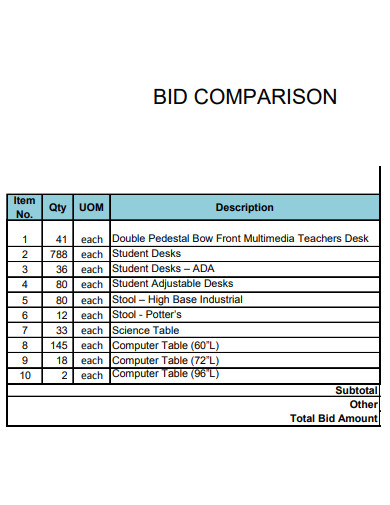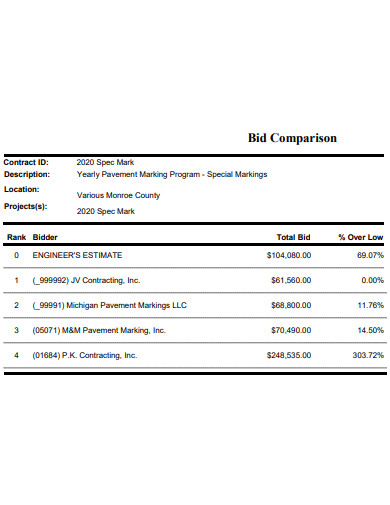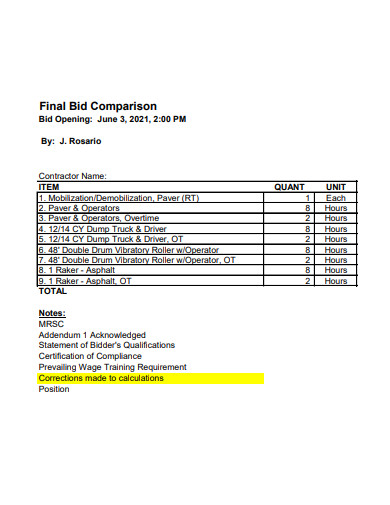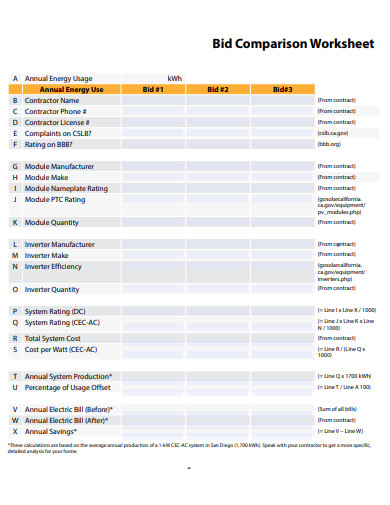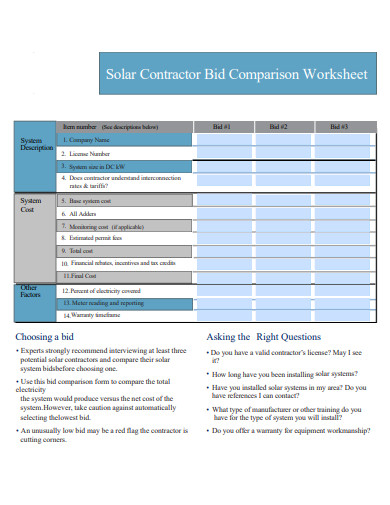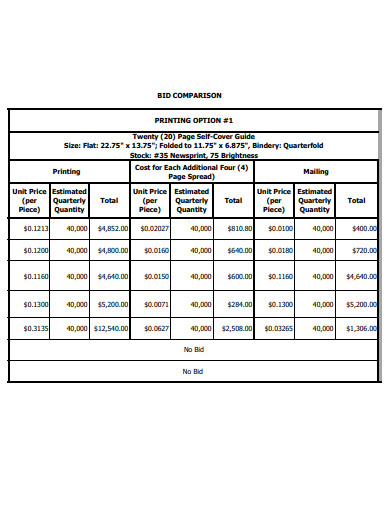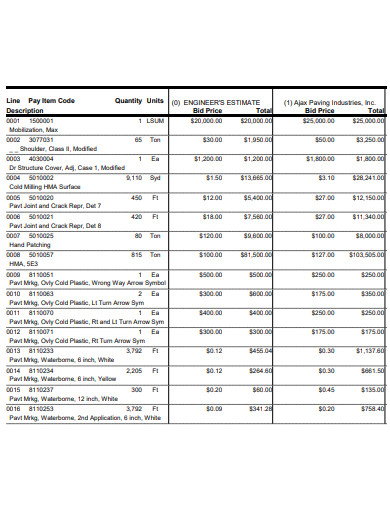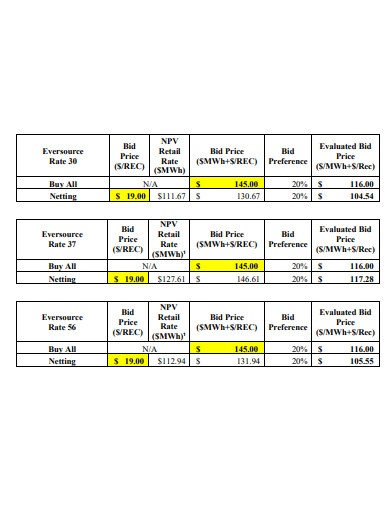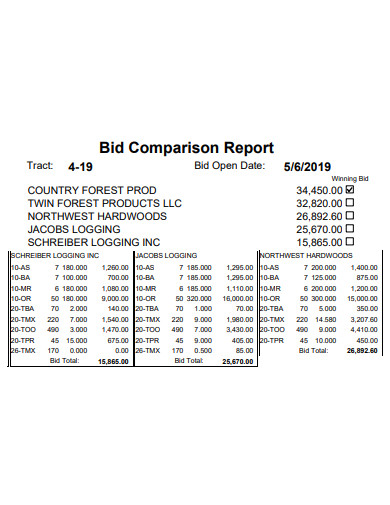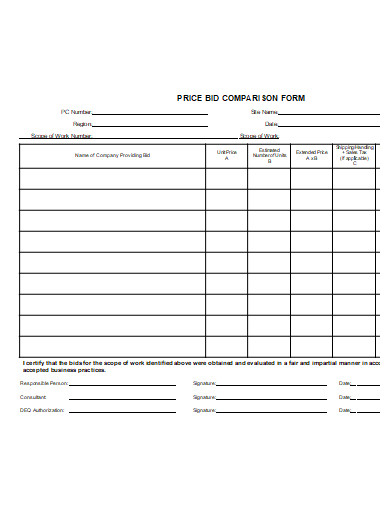A bid is an acquisition offer made by a person or a company to acquire an asset. Bidding is common at auction houses and in other markets, such as the stock market. Companies competing for project contracts may also submit bids. A buyer’s bid specifies how much they’re willing and able to pay for the asset as well as how much they’re interested in purchasing. A bid is also the price a market maker is willing to pay to buy an asset. Market producers, unlike retail customers, must also indicate an ask price.
10+ Bid Comparison Samples
The market is maintained by buyers and sellers. Each participant makes asset purchases and sales easier. Sellers are companies that offer assets for sale. Customers are those looking to buy a product or service. These two parties usually conduct their business at different locations, such as live and online auctions, the stock market, and retail establishments. The bidding procedure is determined by the market where these products and services are sold. Bids at an auction, for example, can be placed in person or online, while investors can place bids on securities like stocks through their brokers. Some bids are done behind closed doors, usually through a confidential process. This method ensures that bidding is transparent and tension-free.
1. Bid Comparison
2. Solar Contractor Bid Comparison
3. Sample Bid Comparison
4. Final Bid Comparison
5. Bid Comparison Worksheet
6. Solar Contractor Bid Comparison Worksheet
7. Simple Bid Comparison
8. Bid Comparison Example
9. Bid Price Comparison
10. Bid Comparison Report
11. Bid Price Comparison Form
Tips in Comparing Bids
Qualify your bidding contractors
By qualifying your bidders, you can avoid speculating about them and the quality of the finished product based on something you already know. You can acquire extra insights to assist you make your selection by researching and reviewing prospective contractors for your project. Talking with professionals in the field can be advantageous because they may be more knowledgeable about the complexities and can provide extra details about best practices. Working with professionals is also advantageous since, if a problem emerges, they are more likely to offer practical solutions.
Remember the power of 3
Receiving at least three quotations from contractors is advantageous since it gives you enough options to obtain the knowledge and quality you require. You may not have enough bids to evaluate if you only have three. Then, if you receive too many bids, you may have so much data to compare that you are unable to make an informed decision because you are evaluating several potential partners appears to be the ideal proportion based on consumer feedback.
Provide a detailed and thorough scope of work ahead of time
In your RFP (request for proposal), including a precise and complete scope of work might help your contractors better grasp your property’s unique demands. If you’re unsure about your scope of work, you can always get advice from professional industry specialist to ensure that the information you offer is correct. Allow prospective contractors to ask you questions to provide extra information, especially when they are generating your estimate.
Perform site walks
Conducting site walks with contractors as part of your bidding process is another option. This will allow you to understand more about the various details they observe while on-site, as well as improve the accuracy of your cost estimates. You can also utilize this opportunity to learn more about each possible contractor on a more in-depth basis. This is especially important if you need a partner who is familiar with the subtleties of your property or industry.
Engage in clarifying conversations
You can make a list of queries for each bidding contractor once you’ve received all of your bids and started examining them. You can arrange appointments with each bidder based on your set of questions to make sure you know the quotation and their reasoning for the pricing. This is also a good moment to double-check that the contractor has addressed all of your queries. This will provide you with all of the information and explanation you require to make your final decision.
Think about your budget
It’s critical to consider where each proposal fits into your pre-determined budget throughout the last stages of your comparison process. This can assist you in ensuring that your organization does not go over budget on a future project or determining how to reallocate funds to the budget if required.
Select a winning bid
It’s critical to analyze the facts and information offered by each contractor before making your ultimate decision. If you have any remaining queries, get them answered before selecting your winning bid. Because the last thing you can do is have your work polished after completion, trying to ensure you have all the details and can readily assess pros and downsides is vital. This may take some time, but you’ll get the outcomes you want in the end.
FAQs
Who are the market makers?
Market makers, also known as experts, play an important role in the marketplace’s productivity and liquidity. When computerized price matching fails, they enter the stock market and allow investors to purchase or sell a share by quoting both bid and ask prices. Although specialists are required to quote a price for each stock they trade, the bid-ask spread is unrestricted.
What is an auction?
Auctions are venues where numerous purchasers compete for specific assets such as livestock, household items, real estate, tax liens, and art. These events are normally performed in person, but with the advancement of technology, online auctions have become a reality.
Individuals can use bids to buy goods and services at auctions and other venues. It’s a bidding war in which two or more parties compete to outbid one other by increasing the price they’re willing to pay to get the item. You can place bids on a variety of items, including real estate, cattle, luxury goods, art, vehicles, government contracts, and even investment funds.
Related Posts
FREE 10+ Brand Story Samples in PDF | MS Word
FREE 10+ Brand Guidelines Samples in PDF | MS Word
FREE 10+ Employee Offboarding Samples in PDF | MS Word
FREE 10+ Process Documentation Samples in PDF | MS Word
FREE 3+ Introduction About Myself Samples in PDF
FREE 10+ Process Map Samples in PDF | MS Word
FREE 10+ Decision Matrix Samples in MS Word | PDF | DOC
FREE 10+ Diversity and Inclusion Statement Samples [ University, Faculty, Value ]
FREE 10+ HR Records Samples in PDF | MS Word
FREE 10+ Brand Brief Samples in PDF | MS Word
FREE 10+ Merger and Acquisition Template Samples in PDF | MS Word
FREE 10+ Cost Comparison Samples in PDF | MS Word
FREE 10+ Brand Pyramid Samples in PDF
FREE 10+ Workflow Mapping Samples in PDF | MS Word
FREE 10+ Requirements Gathering Samples in PDF | MS Word

